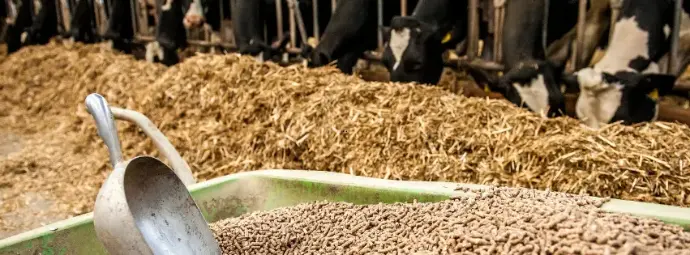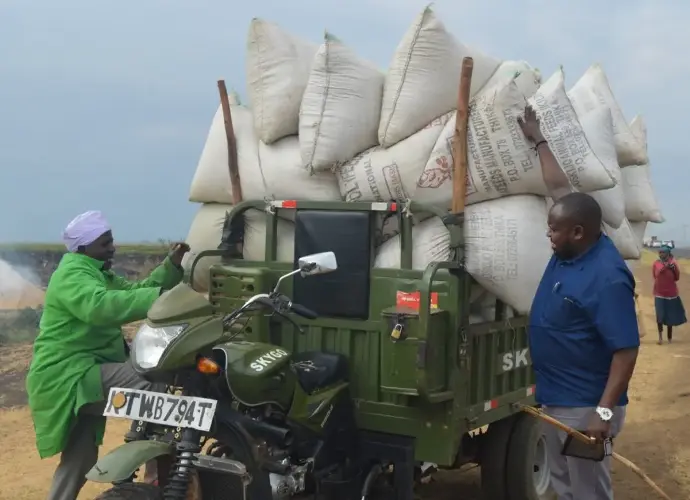Resources - Policy Briefs
Explore our comprehensive Policy Briefs, addressing key agricultural challenges in East Africa. Discover actionable recommendations for enhancing youth participation, improving access to finance, ensuring quality inputs, and promoting sustainable development and food security.
Policy Brief: Regional Trade in Staples for Equitable Food and Nutrition Security and Ecosystems Services
This series of policy briefs addresses the critical challenges of food security deterioration and ecosystem degradation in East Africa. Each brief highlights the significant economic costs associated with these issues and outlines comprehensive approaches to mitigate these trends by integrating ecosystem management and gender considerations into trade and agricultural policies.
Key recommendations include establishing functional integrated frameworks for ecosystem management, valuing ecosystem services, promoting gender equality in land access, and enhancing collaboration among sectors. These strategies aim to foster sustainable agricultural production and improve food security across the region.
costs from ecosystem degradation, wetlands destruction alone costing nearly 2 billion shillings annually.
View Policy Brief
Kenya's annual cost of land degradation is about 11 billion USD, representing 5% of the country's GDP.
View Policy Brief
View Policy Brief
View Policy Brief
View Policy Brief

CARI Policy Brief: Effects of Food Export Bans on Availability, Farm Gate and Consumer Prices of Rice in Tanzania
This CARI policy brief examines the impact of export bans on rice in Tanzania, revealing that such bans have not achieved their intended goals of ensuring food availability and reducing consumer prices. Instead, export bans have led to lower producer prices, decreased trade volumes, and increased consumer prices due to hoarding. The brief recommends abolishing export bans and emphasizes the importance of free markets. It also suggests improving data collection on food sufficiency and enhancing government capacity to store rice during surplus periods to stabilize the market.
CARI Policy Brief: Implications of Non-Tariff Barriers (NTBs) on Profitability and Market Access among Rice Processors in Tanzania
This CARI policy brief highlights the negative impact of non-tariff barriers (NTBs) on rice profitability and market access for millers in Tanzania.
NTBs increase the cost of rice marketing, reducing gross profits by up to 5% for domestic sales and up to 20% for exports. Key issues include clearance fees, health certificate costs, and bureaucratic procedures, which make Tanzanian rice less competitive. Additionally, NTBs such as police roadblocks and multiple weighbridges significantly increase the time required to reach markets, further limiting market access.

Policy Brief: Implication of Limited Access to and Control Over Land on Youth Participation in Agriculture
This policy brief explores the challenges faced by youth in Uganda regarding access to and control over land, which significantly impacts their participation in agriculture. Despite various policies and laws aimed at streamlining land processes, issues such as landlessness, discrimination, and inadequate land administration persist. The brief highlights the need for policy reforms, public awareness campaigns, and better land management practices to enhance youth engagement in agriculture. Key recommendations include shortening the land legalization process, sensitizing the public about land rights, and setting aside land for youth development projects.
Policy Brief: Implication of Limited Access to Finance on Youth Participation in Agriculture
This policy brief explores the challenges faced by youth in Uganda regarding access to finance, which significantly impacts their participation in agriculture. Despite various government initiatives aimed at improving financial access, such as the Agricultural Credit Facility and Youth Livelihood Programme, many youths still struggle with high collateral requirements, high interest rates, and limited financial institutions in their vicinity. The brief highlights the need for developing a comprehensive agricultural finance policy, scaling up successful finance models, and increasing awareness about existing financial products. Key recommendations include adopting innovative collateral solutions, enhancing public-private partnerships to de-risk agriculture, and improving the delivery of financial services tailored to agricultural value chains.
Policy Brief: Implication of Limited Input Access and Quality on Youth Participation in Agriculture
This policy brief examines the challenges faced by youth in Uganda regarding access to quality agricultural inputs, which significantly impacts their participation in agriculture. Despite various policies and initiatives aimed at improving input access, issues such as unauthentic seeds, fake pesticides, and poor-quality fertilizers persist. These problems lead to substantial losses in expected output and discourage youth from engaging in agriculture. The brief highlights the need for enacting the National Seed Policy, increasing public awareness, and improving enforcement of input quality regulations. Key recommendations include scaling up initiatives like the "KAKASA" program, enhancing institutional capacity, and ensuring timely delivery of high-quality inputs.